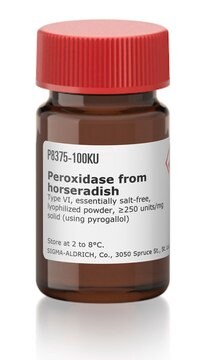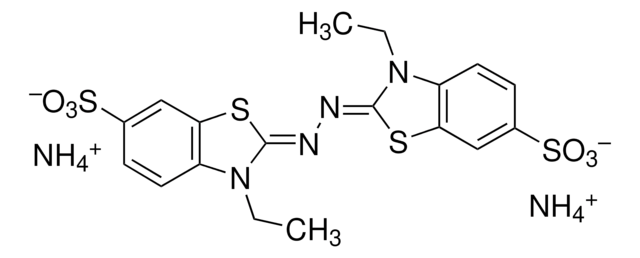40452
Laccase from Agaricus bisporus
powder, deep brown, ≥4 U/mg
Synonyme(s) :
Uroshiol oxidase
About This Item
Produits recommandés
Source biologique
fungus (Agaricus bisporus)
Forme
powder
Activité spécifique
≥4 U/mg
Caractéristiques du produit alternatif plus écologique
Design for Energy Efficiency
Learn more about the Principles of Green Chemistry.
sustainability
Greener Alternative Product
Couleur
deep brown
Autre catégorie plus écologique
, Enabling
Conditions d'expédition
wet ice
Température de stockage
−20°C
Chaîne SMILES
[n]1(c(c(cc1C)C=O)C)CC
InChI
1S/C9H13NO/c1-4-10-7(2)5-9(6-11)8(10)3/h5-6H,4H2,1-3H3
Clé InChI
NWDZDFOKSUDVJV-UHFFFAOYSA-N
Catégories apparentées
Description générale
Application
Actions biochimiques/physiologiques
Définition de l'unité
Mention d'avertissement
Danger
Mentions de danger
Conseils de prudence
Classification des risques
Resp. Sens. 1
Code de la classe de stockage
11 - Combustible Solids
Classe de danger pour l'eau (WGK)
WGK 1
Point d'éclair (°F)
Not applicable
Point d'éclair (°C)
Not applicable
Équipement de protection individuelle
Eyeshields, Gloves, type N95 (US)
Faites votre choix parmi les versions les plus récentes :
Déjà en possession de ce produit ?
Retrouvez la documentation relative aux produits que vous avez récemment achetés dans la Bibliothèque de documents.
Les clients ont également consulté
Notre équipe de scientifiques dispose d'une expérience dans tous les secteurs de la recherche, notamment en sciences de la vie, science des matériaux, synthèse chimique, chromatographie, analyse et dans de nombreux autres domaines..
Contacter notre Service technique








